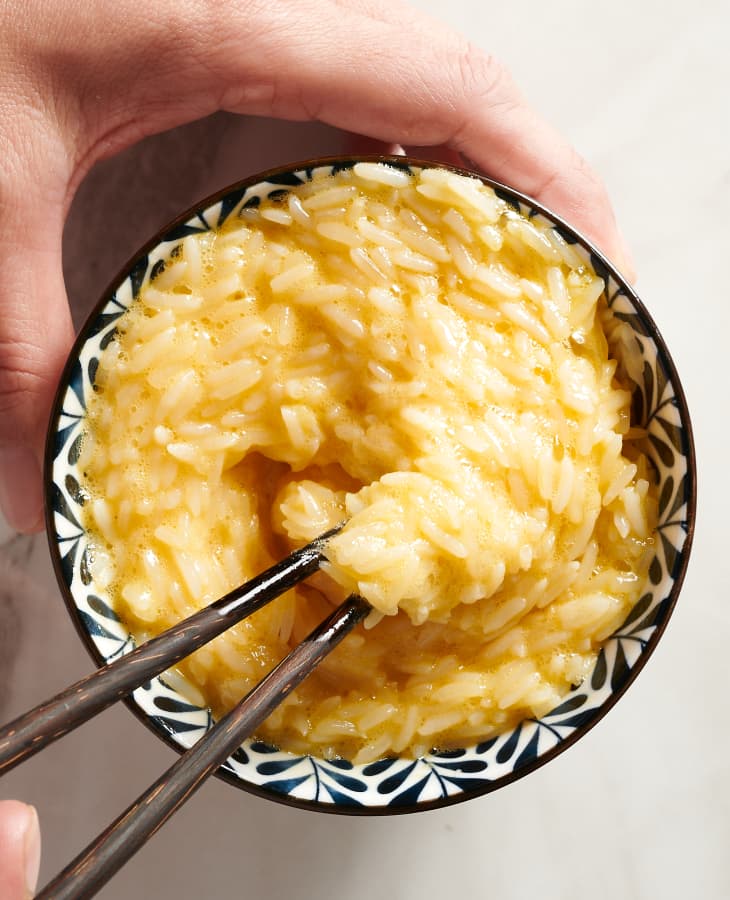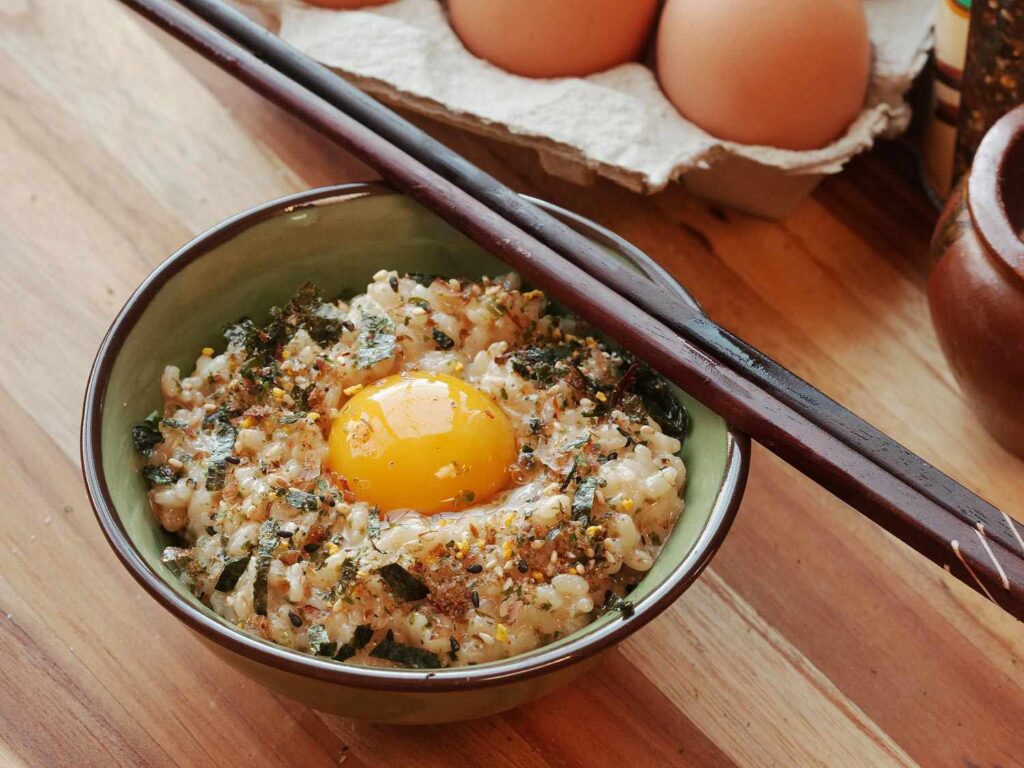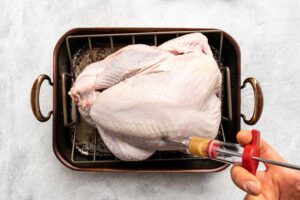Raw eggs in rice is a beloved dish in many cultures. It’s simple, nutritious, and delicious.
Raw eggs mixed with hot rice create a creamy texture that’s hard to resist. This dish is known by different names in various countries, like “Tamago Kake Gohan” in Japan. People enjoy it for breakfast, lunch, or even dinner. The combination of the warm rice and raw egg yolk creates a unique taste and texture.
It’s a quick meal that’s rich in protein and vitamins. Many add soy sauce or other seasonings to enhance the flavor. Curious about this dish? Let’s dive into the world of raw eggs in rice and discover why it’s so popular.

Credit: www.youtube.com
Introduction To Raw Eggs In Rice
Raw eggs in rice is a dish that is both simple and delicious. This combination is popular in many cultures. The dish is often enjoyed for breakfast but can be eaten any time of day. The raw egg is mixed into hot rice, creating a creamy texture that is both comforting and satisfying.
Cultural Background
Raw eggs in rice has deep roots in various cultures. In Japan, this dish is known as Tamago Kake Gohan. It is a traditional meal that is both quick and nutritious. In Korea, a similar dish is called Saengseon Hoe Deopbap, where raw egg is mixed with rice and fish. Each culture has its unique twist on this simple yet versatile dish.
Health Benefits
Raw eggs in rice offers several health benefits. Raw eggs are rich in protein, which is essential for muscle growth and repair. They also contain vitamins such as B12 and D, which support brain health and immune function. Rice, particularly brown rice, is a great source of fiber and provides long-lasting energy.
| Nutrient | Benefits |
|---|---|
| Protein | Supports muscle growth and repair |
| Vitamins B12 and D | Supports brain health and immune function |
| Fiber | Provides long-lasting energy |
Including raw eggs in rice can make a balanced and nutritious meal. It is easy to prepare and can be customized with various toppings. Add some green onions, soy sauce, or sesame seeds for extra flavor. This dish is not only tasty but also packed with nutrients.
Nutritional Value Of Raw Eggs
Raw eggs are a great addition to your diet. They are packed with essential nutrients. Let’s explore the nutritional value of raw eggs.
Protein Content
Raw eggs are an excellent source of protein. One large raw egg contains about 6 grams of protein. This helps in muscle building and repair. Protein is also essential for healthy skin, hair, and nails.
Vitamins And Minerals
Raw eggs are rich in vitamins and minerals. They contain vitamin A, which is good for your eyes. They also have vitamin D, which supports bone health.
Here is a table showing some key vitamins and minerals found in raw eggs:
| Vitamin/Mineral | Amount per Large Egg |
|---|---|
| Vitamin A | 70 mcg |
| Vitamin D | 1 mcg |
| Vitamin B12 | 0.6 mcg |
| Iron | 0.9 mg |
Raw eggs also contain vitamin B12. This is important for nerve function and red blood cell formation. They provide iron, which helps transport oxygen in the blood.
To sum up, raw eggs are a simple way to boost your nutrition. They offer a wealth of protein, vitamins, and minerals.
Nutritional Value Of Rice
Rice is a staple food for many around the world. It is a key source of energy and essential nutrients. Understanding the nutritional value of rice can help you make informed dietary choices. Let’s delve into what makes rice so valuable to our diet.
Carbohydrates And Energy
Rice is rich in carbohydrates. These carbs are a primary source of energy. When you eat rice, your body converts these carbs into glucose. This glucose fuels your daily activities and keeps you energized.
Here’s a quick look at the carbohydrate content in different types of rice:
| Type of Rice | Carbohydrates (per 100g) |
|---|---|
| White Rice | 28g |
| Brown Rice | 23g |
| Basmati Rice | 25g |
| Jasmine Rice | 27g |
Essential Nutrients
Rice is not just about carbohydrates. It also contains important nutrients:
- Vitamins: Rice has B vitamins like thiamine and niacin. These help in energy production and brain function.
- Minerals: Minerals like magnesium, phosphorus, and manganese are present in rice. They support bone health and metabolic processes.
- Fiber: Brown rice is a good source of dietary fiber. Fiber aids in digestion and helps maintain a healthy gut.
In summary, rice is a nutritious food that offers a balance of energy and essential nutrients. Including rice in your diet can support your overall health and wellbeing.

Credit: norecipes.com
Popular Dishes Featuring Raw Eggs And Rice
Raw eggs and rice create a unique culinary experience. This combination is popular in many Asian dishes. It adds a rich, creamy texture to the rice. Here are two famous dishes that highlight this pairing: Japanese Tamago Kake Gohan and Korean Bibimbap.
Japanese Tamago Kake Gohan
Japanese Tamago Kake Gohan is a simple, yet delicious dish. The name translates to “egg on rice.” It consists of raw egg mixed with hot rice.
To make Tamago Kake Gohan, start with a bowl of steamed rice. Crack a fresh egg over the hot rice. Add soy sauce for flavor. Mix well until the egg coats every grain of rice. The heat from the rice gently cooks the egg. This creates a creamy texture and rich taste.
Many people add toppings to enhance the dish. Common toppings include:
- Chopped green onions
- Sesame seeds
- Seaweed strips
- Pickled vegetables
Each bite is a comforting blend of flavors and textures. Tamago Kake Gohan is often enjoyed for breakfast. It is quick, nutritious, and satisfying.
Korean Bibimbap
Korean Bibimbap is another popular dish featuring raw egg and rice. The word “bibimbap” means “mixed rice.” This dish is a colorful and nutritious meal.
Bibimbap starts with a bowl of steamed rice. Various vegetables and proteins are added. Common ingredients include:
- Sautéed spinach
- Carrots
- Bean sprouts
- Zucchini
- Marinated beef or tofu
A raw egg yolk is placed on top. The dish is completed with a dollop of gochujang (Korean chili paste). Mix everything together before eating. The raw egg coats the ingredients. It creates a rich, creamy sauce that binds the flavors.
Bibimbap is a balanced meal. It offers a variety of textures and tastes. Each bite is a burst of fresh, spicy, and savory flavors. This dish is often served in a hot stone bowl. The bowl keeps the rice warm and creates a crispy layer at the bottom.
These dishes showcase the versatility of raw eggs and rice. They are easy to make and full of flavor. Try them at home for a tasty and unique meal.
Preparation Tips
Cooking raw eggs in rice might seem simple, but it requires some care. The quality of your ingredients and the cooking method can make a big difference. Here are some tips to help you make the perfect dish.
Choosing Quality Eggs
Start with fresh, high-quality eggs. Check the expiration date. Look for clean, uncracked shells.
| Characteristic | Quality Indicator |
|---|---|
| Shell | Clean and uncracked |
| Expiration Date | Not expired |
| Storage | Refrigerated |
Organic or free-range eggs are often fresher and tastier. They also have better nutritional value.
Cooking Rice Perfectly
Perfect rice is key to this dish. Follow these steps for the best results:
- Rinse the rice until the water runs clear.
- Use a rice cooker or a pot with a tight lid.
- Measure the water carefully. Usually, 1 cup of rice needs 1.5 cups of water.
Cook the rice until it is fluffy. Avoid overcooking or undercooking.
- Tip: Let the rice rest for 10 minutes after cooking.
This helps the rice absorb any remaining moisture and become more flavorful.
Safety Considerations
Raw eggs in rice can be a delicious dish. But, ensuring safety is crucial. Follow these guidelines to enjoy your meal without health risks.
Proper Egg Handling
Handle eggs with care to prevent contamination. Always buy eggs from a trusted source. Check for cracks before purchasing. Store eggs in the refrigerator at 40°F (4°C) or lower. Keep them in their original carton.
Wash your hands before and after handling eggs. Use clean utensils and surfaces. Avoid using eggs past their expiration date. Freshness is key for safety.
Avoiding Contamination
Cross-contamination can be a major risk. Keep raw eggs away from other foods. Use separate cutting boards for eggs and other ingredients. Clean kitchen tools thoroughly after use.
Cook rice to the proper temperature. Serve the dish immediately after preparation. Avoid leaving it at room temperature for long periods.
Safe Consumption Tips
- Store leftovers in the refrigerator within two hours.
- Reheat to at least 165°F (74°C) before eating.
- Discard any food left out for more than two hours.
Follow these guidelines to enjoy raw eggs in rice safely. Prioritize cleanliness and proper storage. Enjoy your meal with peace of mind.
Flavor Enhancements
Adding raw eggs to rice is a delightful experience. The eggs create a creamy texture that elevates the dish. But, you can make it even better. Let’s explore some flavor enhancements that will make your rice taste amazing.
Adding Soy Sauce
Soy sauce is a fantastic addition to raw eggs in rice. It brings a salty, umami flavor that complements the eggs. Here’s how to use it:
- Start with a small amount, about one tablespoon.
- Mix it well with the raw eggs before adding to the rice.
- Taste and adjust, adding more if needed.
Soy sauce not only adds flavor but also gives the rice a beautiful color. Choose a good quality soy sauce for the best results.
Incorporating Vegetables
Adding vegetables brings both color and nutrients to your dish. Here are some great options:
| Vegetable | Benefits |
|---|---|
| Carrots | Rich in vitamin A and adds a sweet flavor. |
| Peas | High in fiber and adds a slight crunch. |
| Spinach | Loaded with iron and gives a fresh taste. |
To incorporate vegetables:
- Chop them into small pieces.
- Lightly sauté or steam to soften.
- Mix them with the rice and raw eggs.
Vegetables not only enhance the flavor but also make the dish healthier. Experiment with different vegetables to find your favorite combination.

Credit: www.thekitchn.com
Raw Eggs In Rice Recipes
Raw eggs in rice, a traditional Japanese dish, offers a simple yet delicious meal option. It is known as Tamago Kake Gohan in Japan. This dish combines the softness of rice with the richness of raw eggs, creating a unique flavor. Let’s dive into some easy and advanced recipes to enjoy this classic dish.
Basic Recipe
This basic recipe requires minimal ingredients and steps.
- Ingredients:
- 1 cup of cooked white rice
- 1 raw egg
- 1 tablespoon soy sauce
- Salt to taste
- Instructions:
- Place the hot rice in a bowl.
- Crack the egg over the rice.
- Add soy sauce and a pinch of salt.
- Mix well until the egg is evenly distributed.
Advanced Variations
For those who want more flavor, try these advanced variations.
| Variation | Additional Ingredients | Instructions |
|---|---|---|
| Spicy |
|
|
| Cheesy |
|
|
| Vegetable |
|
|
Frequently Asked Questions
Is It Safe To Eat Raw Eggs In Rice?
Yes, if the eggs are fresh and pasteurized. Ensure the rice is hot to minimize risk.
How Do You Mix Raw Eggs In Rice?
Crack a fresh egg over hot rice. Stir quickly to cook the egg slightly.
What Are The Benefits Of Raw Eggs In Rice?
Raw eggs add protein and a creamy texture. They enhance the flavor and nutritional value.
Can You Use Any Type Of Egg?
Use fresh, pasteurized eggs to minimize health risks. Organic eggs are also a good choice.
Conclusion
Eating raw eggs in rice can be a delicious and nutritious choice. It adds a unique texture and rich flavor to your meal. Remember to always use fresh, high-quality eggs. This ensures safety and enhances taste. Experiment with different seasonings to find your perfect mix.
Enjoy your rice with confidence and savor every bite. Give this simple recipe a try and discover a delightful new way to enjoy rice. Happy cooking!




